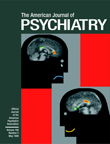Olanzapine Versus Placebo in the Treatment of Acute Mania
Abstract
OBJECTIVE: The primary intent of this study was to compare the efficacy and safety of olanzapine and placebo in the treatment of acute mania. METHOD: The design involved a random-assignment, double-blind, placebo-controlled parallel group study of 3 weeks’ duration. After a 2- to 4-day screening period, qualified patients were assigned to either olanzapine (N=70) or placebo (N=69). Patients began double-blind therapy with either olanzapine, 10 mg, or placebo given once per day. After the first day of treatment, the daily dose could be adjusted upward or downward, as clinically indicated, by one capsule (olanzapine, 5 mg/day) within the allowed range of one to four capsules. The primary efficacy measure in the protocol was defined as a change from baseline to endpoint in total score on the Young Mania Rating Scale. Clinical response was defined a priori as a decrease of 50% or more from baseline in Young Mania Rating Scale total score. RESULTS: The olanzapine group experienced significantly greater mean improvement in Young Mania Rating Scale total score than the placebo group. On the basis of the clinical response criteria, significantly more olanzapine-treated patients (48.6%) responded than those assigned to placebo (24.2%). Somnolence, dizziness, dry mouth, and weight gain occurred significantly more often with olanzapine. There were no statistically significant differences between the olanzapine-treated and placebo-treated patients with respect to measures of parkinsonism, akathisia, and dyskinesias. No discontinuations of treatment due to adverse events occurred in the olanzapine treatment group. CONCLUSIONS: The results from this study suggest that compared with placebo, olanzapine has superior efficacy for the symptoms of acute mania.



